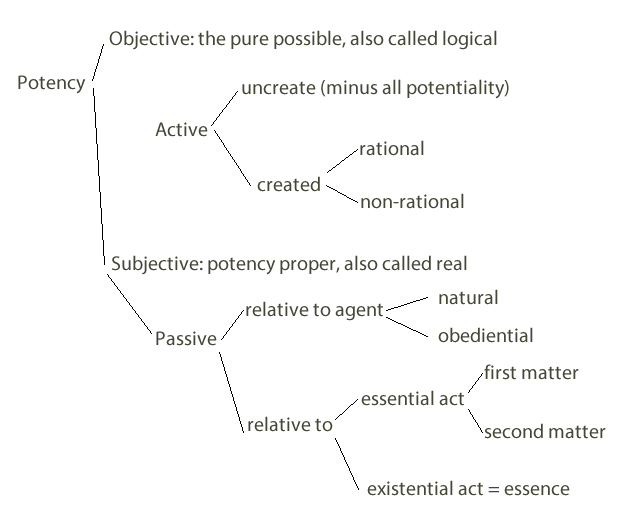Introduction to the Philosophy of St. Thomas Aquinas
Ch 6: Act and Potency
2. Potency
a) Meaning of potency. Potency belongs to those primary analogous notions that cannot be defined, in the proper sense of the word. We have therefore to proceed as it were inductively, by examples, and by comparing one notion against its opposite, since what a thing is, is often conveyed by what it is not.
A first differentiation to be made is between potency and its cognate, possibility. Like being in potency, possibility denotes relation to existence; it can exist. But it does not yet exist in reality, it exists only in the mind of the one conceiving it, ultimately and basically in the mind of God. Because the possible as such exists only as an object of thought it is called objective potency; whereas potency in the proper sense, the sense spoken of here, is named subjective, meaning 1) it exists in a real subject, and 2) it is something real in the subject (having real, as opposed to conceptual, being).5
The mere possible, it follows, is simply that which does not involve contradiction; not yet real, it can be realized, at least by the power of God. By contrast, potency (or being in potency) belongs, as we have said, to the order of reality, as that ingredient of it which determines its further realizations - or better, actualizations. However, to be in reality is not necessarily to be in act; this is a crucial point, and it escaped Parmenides. Potency is real, a real mode of the subject, but it is not actual; indeed, potency as such is never in act, though what is in potency in one respect may be in act in another. It is fruitless, however, to seek a graphic image of a reality of this kind; the imagination does not portray it, but the intellect conceives it. Nor should the potential be equated with the implicit; the implicit may well be actual, never so the potential. 6
But all this is a negative analysis of potency; and since no reality is all negation, a more positive conception is wanted. But how go about finding it? Simply by recourse to particular instances, to concrete examples, which will supply the analogies from which the positive concept can be formed. The case of the statue will do. The statue is in the marble that has not been carved, but it is there in potency. Or, another instance, thought is in the intellect that is not thinking, but it is there in potency. Now, whatever the instance, we find one thing common to the state of potency, namely relation to act. Potency always expresses relation to act: potentia dicitur ad actum. This is the quintessence of potency, its truest essential. Going a step further, we can say that potency is related to act as the state of imperfection to the state of perfection or completion. The finished statue is the statue in the state of perfection; in the uncarved marble it was in the state of imperfection. Where there is potency, there is imperfection, of necessity. Two things, accordingly, characterize every potency: relation to act, and imperfection. Whatever else be said of potency, nothing does it better than these.
b) Division of potency.7 Aristotle, as is his way in such matters, first sets out what he considers to be the basic kind of potency, the one in reference to which other potencies are named. This is the potency called active, the power to effect a change in another as other. Corresponding to this is the potency named passive, the capacity a thing has to be changed by another as other. Aristotle further distinguishes the rational and the nonrational potencies. Disregarded altogether, however, are those which are potencies only by equivocation, as occurs (say) in geometry, where one thing is said to be, or not to be, a "power" of another, depending on their relation or nonrelation. On the whole, then, potencies can be catalogued as follows (which includes some important additions of Scholastic origin):
Potency in the proper sense is the kind called subjective, which is divided against the mere possible, or objective potency.
Subjective potency is subdivided into active potency, the principle of activity in an agent,8 and passive potency, the capacity of a thing to be changed by another.9
Considered in reference to the agent passive potency, moreover, is either natural or obediential: natural if the reference is to an agent immediately proportioned to it, obediential if it must be referred to a transcendent agent, specifically to the agency of God.
In regard to its act passive potency is further differentiated according as it relates to essential act (substantial and accidental form) or to existential act, the act that is existence. Active potency, for its part, is created or uncreated; if created it pertains either to the order of immanent action, thus the rational potencies, or to action which is essentially transeunt, the case of nonrational potencies. All which, in sketch, is this:

Footnotes
5 Attention might well be called to the special meaning of "objective" and "subjective" in this context, for in more popular parlance the objective order is precisely the order of reality and the subjective order the realm of the mind. - [Tr.]6 It should perhaps be added that another way of distinguishing the mere possible from potency proper is to designate the former as logical potency and the latter as real potency. - [Tr.]
7 Cf. Metaph. 0, 1-2.
8 Latin: principium transmutationis in aliud in quantum est aliud.
9 Latin: principium quod aliquis moveatur ab alio in quantum aliud.